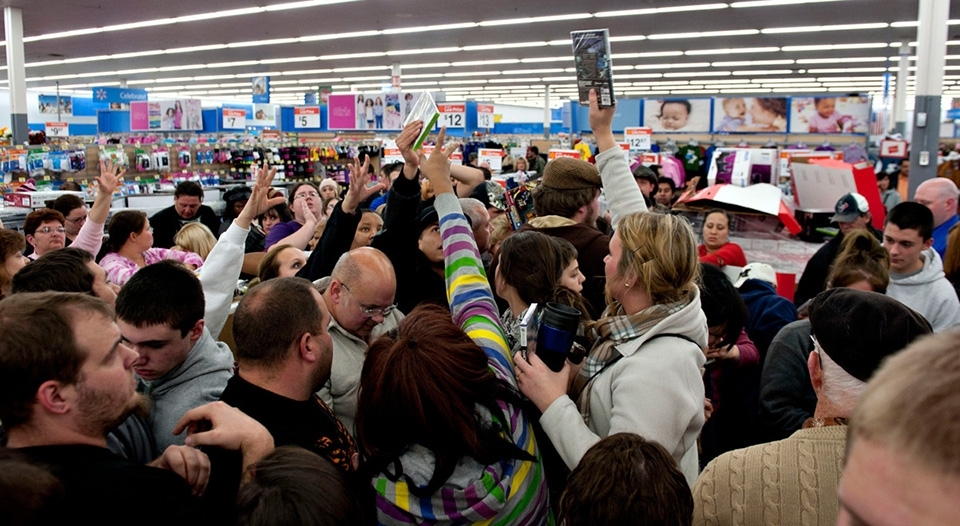Why is It Called Black Friday?
| Table of Contents |
What is Black Friday?
Black Friday is the day after Thanksgiving has been the unofficial beginning of the Christmas season since the late 19th century when President Abraham Lincoln designated the Thanksgiving holiday as the last Thursday in November. But the day didn't earn the name "Black Friday" until much later.
Black Friday (Holiday Shopping) has two relevant meanings. Black Friday was a stock market catastrophe that took place on September 24, 1869. On that day, after a period of rampant speculation, the price of gold plummeted, and the markets crashed.
However, the more modern meaning refers to the day after the Thanksgiving holiday in the United States, which has traditionally been a holiday for many employees. It is traditionally a day filled with special shopping deals and deep discounts, and it is regarded as the start of the holiday shopping season.
| Cyber Monday, the Monday following Black Friday, is a 24-hour online shopping event that was created to encourage people to shop online and is now viewed as an extension of the Black Friday sales. |
Why is it called "Black Friday"?
Black Friday has become a marketing sensation in recent years.
It has been the busiest shopping day of the year since 2005. Retailers routinely open their doors very early in the morning (and in some cases, Thanksgiving evening!) to entice shoppers and offer special sales and promotions to those who arrive early.
Some of the store's special offers are only available in limited quantities. That is why some bargain hunters will camp out in front of stores overnight in order to be the first in line when the doors open.
But why Black Friday?
There are several theories as to how this name came to be.
Historians believe the name originated in the mid-1960s in Philadelphia. The term "Black Friday" was coined by bus drivers and police to describe the heavy traffic that would clog city streets the day after Thanksgiving as shoppers headed to the stores.
Businesses, on the other hand, were put off by the negative connotation of the term "Black Friday." A more positive explanation for the name began to circulate in the early 1980s.
This alternative explanation holds that Black Friday is the day when retailers finally begin to make a profit for the year. Operating at a loss (losing money) is referred to as being "in the red" in accounting because accountants traditionally used red ink to show negative amounts (losses).
Positive figures (profits) were typically written in black ink. Thus, being "in the black" is a good thing because it means the store is profitable (making money).
Regardless of when a retailer makes a profit for the year, it is clear that Black Friday is a critical day for the majority of retailers. Some retailers rely on holiday shopping to make a profit for the year. Others will undoubtedly make larger-than-usual profits — and that's a lot of black ink!
| The money spent by consumers on Black Friday is seen as a measure of the economy. It gives economists a way to gauge consumer confidence and discretionary spending. |
When Is Black Friday?
Black Friday occurs the day after Thanksgiving. In 2021, Black Friday takes place on Nov. 26.
History of Black Friday
 |
| Thanksgiving norm. Photo: Country Living Magazine |
Thanksgiving fell during the fifth week of November in 1939, during the Great Depression. Retailers warned that if the holiday shopping season was too short, they would go bankrupt. They petitioned President Franklin D. Roosevelt to move Thanksgiving to the fourth Thursday of November.
Unfortunately, it was late October by this point. The majority of people had already made their plans. Some people were so upset that they renamed the holiday "Franksgiving" instead. Only 25 states backed FDR's decision. Texas and Colorado observed two holidays, forcing some businesses to give their employees an extra day off.
Congress put an end to the confusion in 1941. According to The Balance, it passed a law making Thanksgiving the fourth Thursday in November mandatory.
Origins of Black Friday Name
The concept of retailers holding post-Thanksgiving Day sales began long before the day was dubbed "Black Friday." For decades, stores have promoted major deals the day after Thanksgiving in an effort to kick off the holiday shopping season with a bang and attract hordes of shoppers, banking on the fact that many companies and businesses gave employees that Friday off.
So, what's the story behind the name? Some claim that the day is named "Black Friday" in honor of the term "black" referring to profitability, which stems from the old bookkeeping practice of recording profits in black ink and losses in red ink. The idea is that retailers will sell enough this Friday (and the following weekend) to put them "in the black" for the rest of the year.
However, the term was coined by overworked Philadelphia police officers long before it appeared in advertisements and commercials. Crowds of shoppers and visitors flocked to the City of Brotherly Love the day after Thanksgiving in the 1950s. On this special day, not only did Philadelphia stores advertise big sales and the unveiling of holiday decorations, but the city also hosted the Army-Navy football game on Saturday of the same weekend.
As a result, traffic officers were forced to work 12-hour shifts to deal with the swarms of drivers and pedestrians, and they were not permitted to take the day off. Over time, the irritated cops began to refer to this dreaded workday as "Black Friday."
The Modern Black Friday Arrives
People began calling in sick the day after Thanksgiving in the 1950s, effectively giving themselves a four-day weekend. Because stores and most businesses were open, those who were off work could get a head start on their holiday shopping. That is, as long as the boss is not present. Rather than attempting to determine who's pay should be reduced and who was truly sick, many businesses began adding that day as another paid holiday.
The term "Black Friday" first appeared in print in 1966. That's when an advertisement in The American Philatelist, a stamp collectors' magazine, appeared. The name was coined by the Philadelphia Police Department to describe the shopping chaos at downtown stores.
The large number of shoppers caused traffic accidents and, in some cases, violence, foreshadowing Black Friday violence to come.
Black Friday Summmary*Black Friday is the day after Thanksgiving and is regarded as the start of the crucial holiday shopping season. *Historically, Black Friday was also a day in 1869 when the price of gold plummeted and stock markets crashed as a result. *Stores offer deep discounts on electronics, toys, and other gifts, or at the very least the first chance for customers to purchase whatever the hottest products are. *Also important for retailers: Cyber Monday, many consumers' first day back to work after a long holiday weekend. |
 |
| Black Friday violence. Photo: dupsm |
One thing hasn't changed: retailers are still using the loss-leader strategy to drive traffic to their stores and websites during the Black Friday season, which now extends well into December, well beyond Cyber Monday with Green Monday on December 10th this year. Selling certain products at a loss increases the amount of money available in your store or website for other related purchases.
More brands are discovering effective ways to integrate the online and offline customer experience. Walmart's mobile app evolved into an interactive guide, allowing customers to plot the quickest path to their preferred deals.
While online sales increased significantly, retailers saw a reassuring increase in in-store traffic, which is something to be thankful for as their most important season of the year continues, according to RIS.
Black Friday Meant "Discounts"With all of the shopping, the Friday following Thanksgiving became one of the most profitable days of the year. The name stuck because accountants use black to indicate profit when recording each day's book entries (and red to indicate loss). So, for retailers and the rest of the economy, Black Friday now means a profitable Friday. This is because retail and consumer spending account for nearly 70% of US GDP. The name was adopted by retailers, but this time to reflect their success. Retailers began offering deep discounts only available on that day to encourage more people to shop. |
Black Friday Shopping Tips
Take advantage of Black Friday sales. Begin with a list of items and compare prices using sale flyers and promotions to see which store has the best deal. Before you go out, make a budget and stick to it.
Read the small print. Some retailers may offer a percentage off the purchase price but exclude specific deals or items such as "doorbusters." Keep an eye out for companies that advertise a high percentage off; the item may be "75% off," but the retailer may inflate the original price. Check the price tags, terms and conditions thoroughly. Investigate whether competitors are selling the item at a lower price online using a secure Wi-Fi connection.
Make a plan for the trip. It's not always necessary to wait to see what deals retailers will offer on Black Friday; many retailers will release Black Friday flyers weeks in advance so that customers can plan their shopping trips. Make a map of the stores you want to visit and what items are available where. Some retailers only honor sale ads for a limited time or on specific days, and they may limit the number of deeply discounted items available for purchase.
Sign up for email notifications. Many stores send out their best Black Friday deals and exclusive coupons to customers who have signed up for their emails. Sign up ahead of time for the holiday season, and then unsubscribe if necessary.
Do your homework. Examine product reviews for heavily discounted items. It could be a lower-priced model or brand that is advertised and is not what the buyer expects. Check BBB.org for the stores' Business Profiles and read what other customers have said.
Understand the return policy and warranty details. Pass along any information about returns, exchanges, repairs, and warranties to the person who will use the item. Gift receipts make it simple for recipients to return or exchange a gift if it isn't quite right, but make sure the gift recipient is able to do so before purchasing.
 How To Find The Best Early Black Friday Deals in the UK? How To Find The Best Early Black Friday Deals in the UK? Black Friday is coming this month and the best deals are waiting for you. What to expect for Black Friday in the UK 2021? Check ... |
 Not Only Black Friday: Top 8 Popular Shopping Holidays Not Only Black Friday: Top 8 Popular Shopping Holidays Americans do not only go shopping on Black Friday; there are numerous other occasions and events that bring them to the shopping malls. You might ... |























